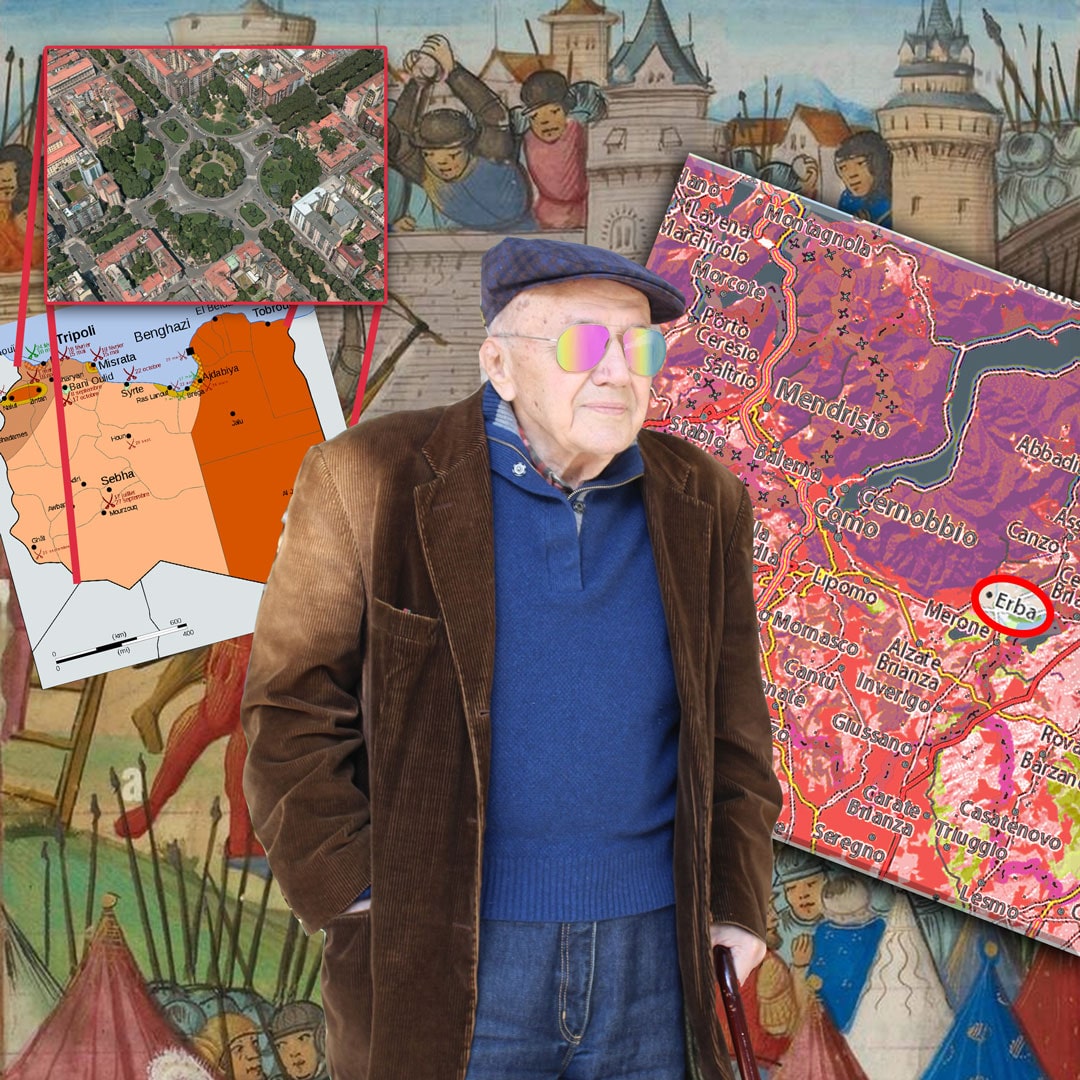INTERVIEW TO DAVE GREENE ‘THE DISTRIBUTIST’
By Astral Pilgrim
30/09/2025
Astral Pilgrim: ADave Greene: D
In many ways, California constitutes the ‘finis mundi’ of the western world, the extreme offshoot of the American pioneers’ westward expansion. That lush land where redwoods end on cliffs plunging sheer into the Pacific Ocean. The land where dreams, hopes and ambitions converge in a vortex of influences from the east and the west. The land where it’s normal to find Mormon temples next to Buddhist centers where the CEO of the new tech start up hosts a seminar on universal compassion while there’s a homeless encampment on the other side of the road. In this land of contradictions, that ever since the 60s has made of ‘rebellion’ its trademark, I’ve had the pleasure of meeting a rebel of the rebellion (the future is the past?), a free thinker, veteran of the Internet who has been publishing essays for years on Youtube and Substack. His reflections deal with the current times while in dialogue with heterodox thinkers of western history. This is the interview with Dave Greene, also known as ‘The Distributist’.
A: Not that many people may know about you among the Italian public. Why don’t you start with a presentation of yourself and your intellectual journey?
D: That’s a good question. I blog under the name Dave Greene, and I run a YouTube channel called ‘The Distributist’, called such because I was partially inspired by G. K. Chesterton and other early 20th century Catholic writers. And as things kind of went on, I got more interested in right-wing scholars of post-modernity and the various schools of non-progressive thought from the 19th and 20th centuries. And that kind of became the subject of my blog: taking those ideas and translating them into the things that were happening around me, mostly online but also off, because there’s increasingly little difference between the two of those things. I think most people know me for popularizing a lot of the work of Curtis Yarvin on YouTube, and somewhat trying to delve into (not so) esoteric authors like Thomas Carlyle and Joseph de Maistre, who were two of my favorites, along with the Italian elite theory schools. I’m also very interested and influenced by Oswald Spengler, who seems to be an increasingly relevant person in this day and age.
A: When it comes to political strategies for people who might feel outside of the mainstream cultural and political zeitgeist, there are different, somewhat converging, somewhat conflicting opinions on what to do in practical terms. Some people might advocate for a Gramscian capture of the institutions approach. Others emphasize decentralization and parallel communities, detachments from the mainstream. What is your stance on this debate?
D: There have always been three schools of thought, which are Entriest, being the Gramscian school, Parallelist, being that we’re going to create an alternative situation that doesn’t intersect with mainstream power institutions and then the Populist or alternatively Accelerationist idea, which is about going faster or overpower the institutions through popular support. Accelerationism and Populism are different things, but they share this idea that you’re going to use a surge to flip things around suddenly. Yarvin is correct in thinking that when you have a system that only has populist power, as we do right now, there is no organized right wing ideology. If you only have populist power, and if you are operating outside of the main oligarchy, then your only option is something that happens very quickly. And this is: always chimp out on Twitter, and then you get what you want from Trump. Always get angry, always be loud. Well, it works in the short term. It is a tried and true strategy of crowds that have only populist power to yell really loudly and get a bone thrown to them from the elite. It's not a viable long term strategy. A chimp out on Tuesday and a freak out on Friday does not add up to a movement on Sunday. That is, they are all just one off things. And so people have to be using what people get from these explosions to actually do something that will last in the long term.
A: Yarvin talks about patchwork and one of his inspirations, Hans Hermann Hoppe, talks about a Europe of a thousand Lichtensteins. If we think in long terms and not election cycles, as you were suggesting earlier, are we going towards an end of the post-Westphalian state? Thinking, let’s say, two centuries ahead, are we going towards a Balkanization of Europe and North America?
D: I think that we’re entering into a region of history where sweeping ideologies that can unify a nation state in terms of consensus seem like they’re falling by the wayside. But the problem is we still live in a global supply chain. I think people kind of blow out of proportion recent technological developments. These computational developments are socially disruptive, but they still operate on the same physical limitations that all other technologies operate under. And those things require energy and energy is something that comes from large physical supply chains of materials and manufacturing processes and grids. Unless there’s a real collapse, I think what’s going to happen is, and this is just a guess, symbiosis between large supply chains and then smaller political parties that operate inside larger alliances. That’s the only thing that seems like it would be potentially stable in the future.
A: Do you think these alliances would be more Internet or geography based?
D: Right now, it feels like community is largely on the Internet and that these things are going to stay on the Internet. But I think that if we hit serious scarcity, then these communities are going to start becoming a little bit more regional. There are just certain cultural, linguistic and ethnic barriers that are just going to be a reality. I think where you ultimately owe your political allegiances will kind of stick to those geographic outlines. Ultimately, there’s one really big wild card in this conversation which is that for the past 80 years now we’ve had this dominant American religion called progressivism or liberal progressivism which has been the dominant religion of both the European, American and Canadian ruling class and also the sort of implicit religion of a lot of our third world or second world allies. This religion seems to be in the process of collapsing and nobody knows what goes into this this vacuum. No one knows what happens at the tail end of this collapse. And so we’re speculating that if there’s no replacement for progressivism, that kind of ideological patchwork in support of a larger supply chain would have to be the stable solution. But who knows what happens if there is a replacement religion? If progressivism actually does die, if it really dies, if something worse happens to it than just losing a few elections and its power structure in the United States is destroyed, will there be the people who are kind of clout chasers who are in New York and Los Angeles then try to glom on to the next biggest thing narrative that’s viable and make that the new kind of center point religion for everywhere else? It’s very possible.
A: Well, this leads me to the next question. You mentioned the importance of language, culture, ethnic vicinity, et cetera. Sinckjje this is for a European audience, and there’s always been a degree of infighting between America and Europe, how much do you think we share a common destiny, as part of the same civilization and how much are we drifting apart on the other hand?
D: Well, almost everyone in Canada defines themselves as not American, even though in an effective sense there after World War Two they shifted from being in the British sphere of influence to being in the American one. Yet all their culture is determined by the liberal side of America, and the same thing is true for Europe. If we’re talking about broadly in the scale of centuries, I don’t see that there’s any way that America and Europe don’t have a common destiny. We are one overarching. This is where you borrow Spengler. We share the same Faustian civilization and we are sharing a common decline in moral and cultural terms. And because of that, the answers will probably look very much the same. Whereas I think that when you look at places like China and Korea, countries sharing similar crisis of modernity, their solutions, I think, are going to be radically different. And they’re also not suffering from the same problems that America and Europe have in terms of immigration. China and Korea don’t have to deal with this idea of defining what it means to be Chinese or Korean. America and Europe now have to, in very short order, come up with an answer to the question about what it means to be American, what it means to be English, Italian, German. And the answer can’t just be following the law and making money. If everyone who follows the law and makes money is a citizen of your country, then in the global postmodern economy, you’re eminently not going to have a country anymore. And because of that, that’s not a sufficient answer to the question. I think in that sense, Europe and America have a common identity. So our destinies on the scale of a hundred years are obviously going to rise and fall more or less the same broad strokes. In the next 10 years, though, there’s all of these nice shiny toys that we can fight over.
A: You mentioned China and Japan, which are obviously very alien societies in respect to the west, but you haven’t mentioned a wild card, a country that is in a constant identity crisis on whether it’s Western or its own thing, and that is Russia.
D: Russia is a very weird case. Spengler was absolutely right about this. The guy was prophetic. If you would have asked me a few years ago, I would have just said Russia is another European country that happened to be a little bit behind the other ones and then got caught up in communism before it had a chance to experience development in the Industrial Revolution. I think Spengler correctly pointed out that Russia, through its association with the fallen Eastern Roman Empire, landed foundationally in this place where it became something entirely different, not quite Magian, not quite Faustian. He also felt that its rulers had been Europeans who had essentially colonized the Russian lands, that all the last 400 years of Russian civilization from when he was writing had been an imposition on the sort of foundational Russianness that had never really expressed itself fully. I think there’s something to that. If you listen to Dugin, all his ideas are they’re fascinating, they’re provocative, they’re totally inappropriate for the Western Europe or America. It’s almost as if he speaks to Russian ears rather than western ones. I would assume Russia is going to take its own course. But the problem is that Russia is still suffering under modernity like everyone else. It still has to deal with these problems with technological disruption, birth rate crisis etc… its answers are not significantly better than the bad ones that we’ve come up with so far and it’s not hard to believe that the West will come up with answers that are better than Russia’s in very short order when it loses its delusional understanding of the 20th century.
A: Continuing this discussion on Europe and America, what’s the different perception of the concept of socialism between the two?
D: I really think that Europe is ahead of us in terms of its perceptions. America, after World War Two, found itself in a place where it had a lot of prosperity and was trying to define itself ideologically. And it did not want to define itself ideologically in nationalist or particularist terms. So the idea was to define America as an ideologically libertarian country of free markets, free minds or whatever. Now, the problem with this is that the 19th century free market version of capitalism is not very relevant in the 21st century, in which almost all of countries are backed by debt. So all of the money that we bandied out is kind of this weird fiat printer printing press currency that’s linked back to a global supply chain that no one really understands and that is really more of a geopolitical object than anything else. So when right wingers in America criticize socialism in the ‘government doing things’ definition of the term what they’re really trying to express is that they don’t like what the Government did from the 1950s onwards. They do not like the large cause of the American government and they refuge against the Government’s desire to remold society along liberal progressive lines. It’s a form of retreat into into your house, into your community, into your property, into your self-assurance, because it was very, very difficult for Americans to claim any kind of thick cultural identity of any kind.
A: You are from the state of California, which is home to the Silicon Valley, a hub that can be the described as crucial for the shaping of the 21st century. It’s also the home of the somewhat recent phenomenon of the ‘Techno-Right’ that so many newspapers are talking about in recent months. Do you see it as an interesting movement or mostly a ruse? And in general, what are your considerations on technology?
D: I would say that technology is a tool that can be used in different ways and it definitely has its benefits for things like penicillin, modern medicine etc… But I think we are witnessing a lot of its downsides that we didn’t anticipate in the early part of the 20th century, namely that technology encourages this increasing complexity of the system and increasing reliance on it which actually degrades the capacity of people of interacting with technology. Social media is a good example of this. I think social media is inherently degenerate because it erodes social bonds. It captures that vitality, channels it into the algorithm and monetizes it. That was the case for Facebook; at first everyone was excited about it but the engagement caused everyone to hate each other and leave Facebook and then the social media network died. I never met anybody who gained more friends on Facebook than they lost. When it comes to the issue of the Techno-Right I think the dichotomy of the good and bad Silicon Valley tech company comes to mind. L,Among those who work in it, it is understood that a good tech company is one that individuates the needs of the public when it comes to solving certain technical problems and then it finds a way to fix them, these are companies that provide a service for which there is a genuine demand. A bad company, on the other hand, is one that tries to create a trend even though there isn’t an organic demand for it, it’s the attempt to push an idea for which there is no demand. The Techno-Right fits the definition of the latter, it’s a product in search of a consumer, a LinkedIn ideology that’s designed to look good on paper and get investors behind it. Nobody is really excited about it, young people are not saying ‘I really want to join the Tech-Right and make Peter Thiel get more money’. Most of the people behind it are rather uninspiring and incapable of providing a grand narrative for the future that people want to rally behind. There is an organic demand for meaning and community but these things are hard to build. What’s not hard is to tell how you are going to colonize Mars, create an artificial superintelligence to rule the world or live forever. These things are too futuristic to trigger any hard questions and to the extent that technology does generate hard political questions the Tech-Right never answers them.
A: Speaking about technology and movements that have sprung from the internet, we have seen, over the past few years, a form of internet based religious revival amongst zoomers. How much of it do you think is genuine and how much it’s destined to be a temporary fashion? What’s your prospective on this issue as a Catholic and as an American?
D: I follow the rule for which only 20% of what you see on the Internet materializes itself in the real world and this phenomenon makes no exception. I think most of it will stay on the internet but a really committed cohort of zoomers will also come out of it. There are internet personalities of the religious sphere like Andrew Wilson or Corey Mahler that I have admired at times but I also think that they have inherent flaws that prevent them from bridging the gap between the real world and the more memetic and internet-based religiosity. When it comes to the Catholic Church, I call them the IBM of the religious world. They are big and always late top the party and by the time they catch up the party is already over. I think it will get through its current obstacles because I believe it’s guided by the Holy Spirit but a lot of the pain will be lessened if it understands that it needs to create the kind of very devoted Core and it has to stop going to war against its traditional adherence, especially in America with the issue of the Latin masses. But even more importantly than the Novus Ordo/Latin Mass debate, the main problem is generational: the Catholic Church is stuck in the 20th century. A lot of people know what time it is in the Catholic Church but it’s going to take a while before they come into leadership positions.
A: You have written about zoomers and dating. My question here is very simple: how bad is the situation?
D: On the issue of zoomers and family formation there are two components to the equation. The first one is the resource one which is the fact that in order for families to form, young men have to have access to resources and specifically jobs and real estate. In other words: How many work hours does it take to get a down payment on a house? In western countries you must also take into account the effect of mass immigration which increases house prices while lowering salaries because it craters the demand for labor. That’s one half of the zoomer dating question. The other half is what social media does to women’s perception of the universe and themselves. This is a big problem, which is that all human minds are degraded by the Internet. Social media really hurts women’s minds and young women’s minds in particular because they’re so attuned to be agreeable and the network and attention-draining effects hit them harder. But ultimately this is, again, a generational struggle. Your country should be run in the interests of its children and their future and the current ruling class is not thinking in those terms at all.
A: One last question. When it comes to the realm of the arts it’s safe to say that most people would find a contemporary art gallery to be unappealling. Where do you think are today’ best venues to find valuable art?
D: I’m probably flattering your readers but the art of the 21st century is definitely the meme. Already by the late part of the 20th century the art galleries were dead, for the past few years Hollywood has also been dead. I think a lot of it is due to the authors no longer being attuned with the people and no longer sharing a common vision with them. For the future I would like to see more local forms of art produced by people that I can trust and with whom I feel a common future and a common vision for the future.









